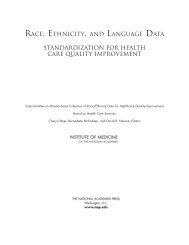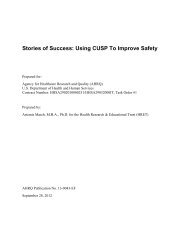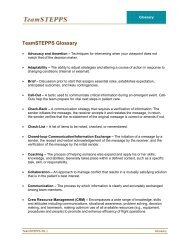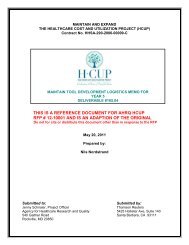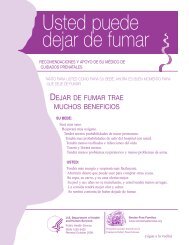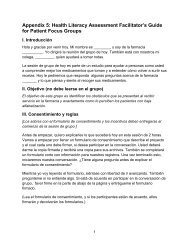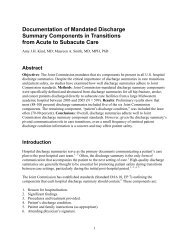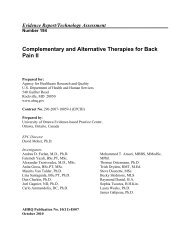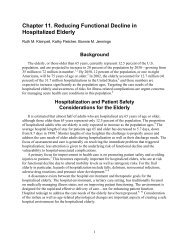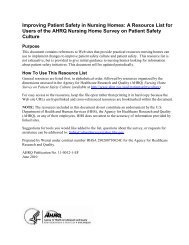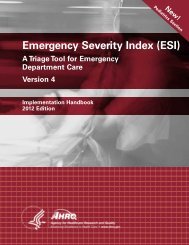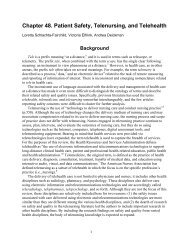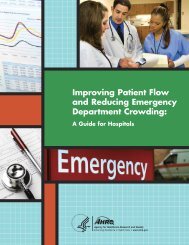Chapter 46. Magnet Environments for Professional Nursing Practice
Chapter 46. Magnet Environments for Professional Nursing Practice
Chapter 46. Magnet Environments for Professional Nursing Practice
Create successful ePaper yourself
Turn your PDF publications into a flip-book with our unique Google optimized e-Paper software.
18<br />
Evidence Table 3. Studies of <strong>Magnet</strong> Characteristics<br />
Source<br />
Laschinger,<br />
Shamian, and<br />
Thomson<br />
2001 40<br />
Thomas-<br />
Hawkins,<br />
Denno, Currier<br />
2003 37<br />
Environment<br />
Issue/Attribute Related<br />
to Clinical <strong>Practice</strong><br />
<strong>Magnet</strong> characteristics—<br />
NWI-R subscales:<br />
• nurse autonomy<br />
• nurse control over practice<br />
setting<br />
• nurses’ relations with<br />
physicians<br />
Other measures:<br />
• trust and confidence in<br />
management —<br />
Interpersonal Trust at Work<br />
Scale<br />
• burnout—The Human<br />
Services Survey, 3<br />
components (emotional<br />
exhaustion,<br />
depersonalization,<br />
decreased personal<br />
accomplishments)<br />
<strong>Magnet</strong> characteristics –<br />
PES/NWI subscales (some<br />
items adapted to reflect setting):<br />
• nurse participation in<br />
hospital affairs<br />
• nursing foundations <strong>for</strong><br />
quality of care<br />
• nurse manager ability,<br />
leadership, and support of<br />
nurses<br />
• staffing and resource<br />
adequacy<br />
• collegial nurse-physician<br />
relations<br />
Design<br />
Type<br />
Crosssectional<br />
studies<br />
Crosssectional<br />
studies<br />
Study Design<br />
& Study Outcome<br />
Measure(s)<br />
Cross-sectional survey<br />
Outcomes:<br />
• job satisfaction<br />
• perceived quality of<br />
care<br />
• perceived quality of<br />
unit<br />
Cross-sectional survey<br />
Outcome:<br />
intentions to leave job<br />
in next year (1 item)<br />
Study Setting<br />
& Study Population<br />
Ontario, Canada<br />
Survey n = 3,016 staff<br />
nurses from medical-surgical<br />
settings (subsample from a<br />
stratified random sample) in<br />
135 hospitals<br />
United States<br />
1,000 staff nurses working in<br />
freestanding hemodialysis<br />
facilities (random sample<br />
from American Nephrology<br />
Nurses’ Association<br />
members)<br />
Key Finding(s)<br />
Model testing with these<br />
variables explained 39–40% of<br />
the variance with either job<br />
satisfaction or nurse-assessed<br />
quality as the outcome.<br />
<strong>Magnet</strong> characteristics<br />
influenced job satisfaction and<br />
perceptions of care quality with<br />
trust in management and<br />
emotional exhaustion as<br />
important mediators.<br />
Higher levels of magnet<br />
characteristics were associated<br />
with higher levels of trust in<br />
management and lower levels of<br />
burnout.<br />
Nurses who intended to leave<br />
their jobs reported significantly<br />
lower levels of magnet<br />
characteristics represented by all<br />
of the PES/NWI subscales<br />
except <strong>for</strong> collegial relations<br />
between nurses and physicians.<br />
Patient Safety and Quality: An Evidence-Based Handbook <strong>for</strong> Nurses



